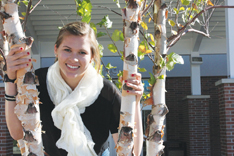 “Only a life lived for others is a life worth living,” Albert Einstein once famously said, speaking of the importance of volunteer work, and I can now attest that to be true.
“Only a life lived for others is a life worth living,” Albert Einstein once famously said, speaking of the importance of volunteer work, and I can now attest that to be true.
Four weeks ago I traveled to Guatemala for eight days to serve on a mission trip with the Castleton United Methodist Church. Four weeks ago I saw poverty and pain like I never could have imagined. Four weeks ago the course of my life changed entirely.
This was my first mission trip, and it was an experience so incredible that when I came home, I wanted to share it with everyone. I wanted to show my photos to the boys in my first period class sitting behind me, griping about the latest iPhone. I wanted to tell my stories to my Twitter followers amidst their complaints about going to work and not getting enough sleep (and I’ll admit, I used to be just like all of them), but then I thought— why not just let them go see it themselves?
Learning outside of the classroom can be just as, if not more, beneficial as learning inside it. Thus, opportunities for high school students to work on service trips either here in Indiana or across the globe need to be made more accessible. In fact, it should be a graduate requirement for all seniors to take part in activities like these, before going off and entering the “real world”. The benefits for the people that missionaries are serving are obvious—while in Guatemala, my team and I installed stoves in homes made out of mud, tin and sticks to provide families with a safe and easy-to-use source of heat—but the benefits for the missionaries are oft-underestimated.
The fact that people have so much less than we do, yet have so much more happiness and more genuine smiles, is incredible. The lessons of humility and graciousness—no doubt just as important as the lessons of writing a thesis statement or how to solve a logarithmic equation—can only truly be learned outside of the classroom.
There is no lesson plan for how to be humble; no statewide curriculum says that all ninth-graders must pass an exam on empathy toward others. These lessons are learned through service, and will stay with you for the rest of your life.
Despite all of the learning I did while abroad, when I returned to the United States, my main welcoming party was a stack of textbooks and a pile of worksheets that ultimately took me two weeks to get caught up on.
If schools offered alternate make-up work related to the service trip, such as writing an essay or creating a presentation to teach others about the experience, students would be more able and willing to take a week or so off of school without the fear of drowning in make-up work. Administrators should be encouraging students to do trips like mine: not only to help other communities and families but also to help our own generation be more open and understanding of lives so different from our own, yet more similar than one would think.
In history class we learn about third-world countries, and on the television we hear about starvation and malnutrition, but actually seeing it in person makes it so real that you can’t change the channel or tune out your teacher. Opportunities must be made available for students to experience what I experienced in order to be well-rounded, understanding of the plights of others and open to trying new things. After all, it takes being somewhere far from home to make you appreciate all you really have.

































![AI in films like "The Brutalist" is convenient, but shouldn’t take priority [opinion]](https://hilite.org/wp-content/uploads/2025/02/catherine-cover-1200x471.jpg)









































![Review: “The Immortal Soul Salvage Yard:” A criminally underrated poetry collection [MUSE]](https://hilite.org/wp-content/uploads/2025/03/71cju6TvqmL._AC_UF10001000_QL80_.jpg)
![Review: "Dog Man" is Unapologetically Chaotic [MUSE]](https://hilite.org/wp-content/uploads/2025/03/dogman-1200x700.jpg)
![Review: "Ne Zha 2": The WeChat family reunion I didn’t know I needed [MUSE]](https://hilite.org/wp-content/uploads/2025/03/unnamed-4.png)
![Review in Print: Maripaz Villar brings a delightfully unique style to the world of WEBTOON [MUSE]](https://hilite.org/wp-content/uploads/2023/12/maripazcover-1200x960.jpg)
![Review: “The Sword of Kaigen” is a masterpiece [MUSE]](https://hilite.org/wp-content/uploads/2023/11/Screenshot-2023-11-26-201051.png)
![Review: Gateron Oil Kings, great linear switches, okay price [MUSE]](https://hilite.org/wp-content/uploads/2023/11/Screenshot-2023-11-26-200553.png)
![Review: “A Haunting in Venice” is a significant improvement from other Agatha Christie adaptations [MUSE]](https://hilite.org/wp-content/uploads/2023/11/e7ee2938a6d422669771bce6d8088521.jpg)
![Review: A Thanksgiving story from elementary school, still just as interesting [MUSE]](https://hilite.org/wp-content/uploads/2023/11/Screenshot-2023-11-26-195514-987x1200.png)
![Review: "When I Fly Towards You", cute, uplifting youth drama [MUSE]](https://hilite.org/wp-content/uploads/2023/09/When-I-Fly-Towards-You-Chinese-drama.png)
![Postcards from Muse: Hawaii Travel Diary [MUSE]](https://hilite.org/wp-content/uploads/2023/09/My-project-1-1200x1200.jpg)
![Review: "Ladybug & Cat Noir: The Movie," departure from original show [MUSE]](https://hilite.org/wp-content/uploads/2023/09/Ladybug__Cat_Noir_-_The_Movie_poster.jpg)
![Review in Print: "Hidden Love" is the cute, uplifting drama everyone needs [MUSE]](https://hilite.org/wp-content/uploads/2023/09/hiddenlovecover-e1693597208225-1030x1200.png)
![Review in Print: "Heartstopper" is the heartwarming queer romance we all need [MUSE]](https://hilite.org/wp-content/uploads/2023/08/museheartstoppercover-1200x654.png)




